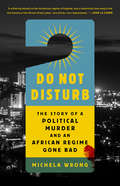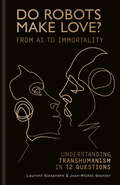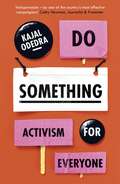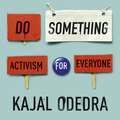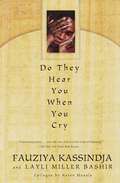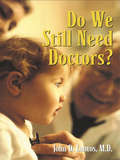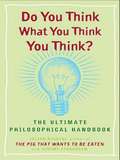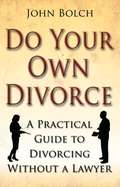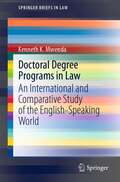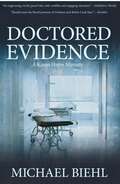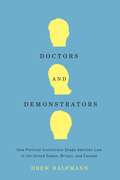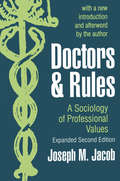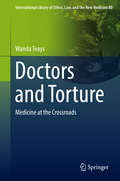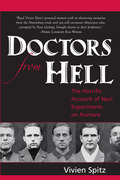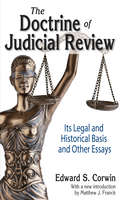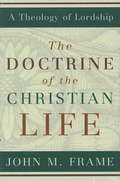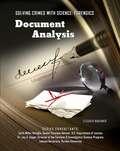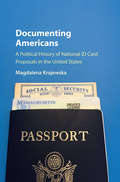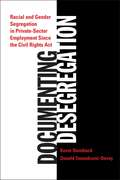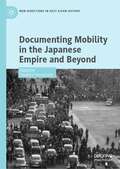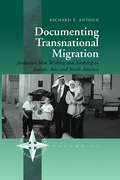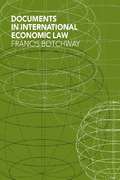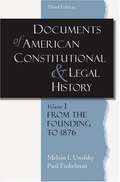- Table View
- List View
Do Not Disturb: The Story of a Political Murder and an African Regime Gone Bad
by Michela WrongA powerful investigation into a grisly political murder and the authoritarian regime behind it: Do Not Disturb upends the narrative that Rwanda sold the world after one of the deadliest genocides of the twentieth century.We think we know the story of Africa&’s Great Lakes region. Following the Rwandan genocide, an idealistic group of young rebels overthrew the brutal regime in Kigali, ushering in an era of peace and stability that made Rwanda the donor darling of the West, winning comparisons with Switzerland and Singapore. But the truth was considerably more sinister. Vividly sourcing her story with direct testimony from key participants, Wrong uses the story of the murder of Patrick Karegeya, once Rwanda&’s head of external intelligence and a quicksilver operator of supple charm, to paint the portrait of a modern African dictatorship created in the chilling likeness of Paul Kagame, the president who sanctioned his former friend&’s assassination.
Do Robots Make Love?: From AI to Immortality – Understanding Transhumanism in 12 Questions
by Laurent Alexandre Jean-Michel BesnierShould we enhance the human condition with technology?Does anyone really want to live for a thousand years?Could AI end up destroying mankind?Discover the incredible potential of mankind's near future as Doctor and entrepreneur Laurent Alexandre and tech-philosopher Jean Michel Besnier go head to head on the big questions in an entertaining and thought-provoking debate on the fundamental principles of transhumanism.This movement seeks to improve the human condition through science - has fast become one of the most controversial the scientific community have ever faced. As great strides are made in using advanced technology to enhance human intellect and physiology, the ethical and moral questions surrounding its possibilities have never been more pressing. Should we change the way we reproduce? Could we enhance the human body with technology to the point where we are all technically cyborgs? Is it possible to make love to a robot?
Do Something: Activism for Everyone
by Kajal Odedra'An indispensable manual for budding activists by one of the country's most effective campaigners.'Cathy Newman, Journalist and Presenter'Tired of complaining but don't know what to do? This beautifully written book will not only inspire you but give you a step-by-step guide to creating positive change.'Magid Magid, Politician and Activist'This is your mayday book. If you want to start your own resistance, buy Do Something.'Deborah Frances-White, Host of The Guilty Feminist podcastDo you find yourself staring helplessly at your news feed? Or all too often asking, 'why hasn't somebody done something about that?'. If the answer is yes, then DO SOMETHING is the book you need.Whether you simply want to challenge your local shop to reduce their plastic or go big and demand a new law to be passed, this book is the place to start.Full of lessons from the real world DO SOMETHING contains practical steps and a blueprint anyone can follow - from helping you to pinpoint the fundamentals of what you want to achieve to mobilising supporters and harnessing traditional and social media. Having worked as a campaigner for over a decade Kajal Odedra knows the tricks that have typically been held by people in circles of power and believes that everyone should know how to speak up and be heard. Revolution on every scale is happening all around the world - but rather than being led by governments, policy makers or political leaders, it is individuals, communities and collectives who are calling for action. People power works! So, stop banging your head against the wall, pick up this book, and start planning your resistance.
Do Something: Activism for Everyone
by Kajal Odedra'An indispensable manual for budding activists by one of the country's most effective campaigners.'Cathy Newman, Journalist and Presenter'Tired of complaining but don't know what to do? This beautifully written book will not only inspire you but give you a step-by-step guide to creating positive change.'Magid Magid, Politician and Activist'This is your mayday book. If you want to start your own resistance, buy Do Something.'Deborah Frances-White, Host of The Guilty Feminist podcastDo you find yourself staring helplessly at your news feed? Or all too often asking, 'why hasn't somebody done something about that?'. If the answer is yes, then DO SOMETHING is the book you need.Whether you simply want to challenge your local shop to reduce their plastic or go big and demand a new law to be passed, this book is the place to start.Full of lessons from the real world DO SOMETHING contains practical steps and a blueprint anyone can follow - from helping you to pinpoint the fundamentals of what you want to achieve to mobilising supporters and harnessing traditional and social media. Having worked as a campaigner for over a decade Kajal Odedra knows the tricks that have typically been held by people in circles of power and believes that everyone should know how to speak up and be heard. Revolution on every scale is happening all around the world - but rather than being led by governments, policy makers or political leaders, it is individuals, communities and collectives who are calling for action. People power works! So, stop banging your head against the wall, pick up this book, and start planning your resistance.
Do Something: Activism for Everyone
by Kajal OdedraA user's guide to Activism by one of the UK's biggest names in grass-roots campaigning shows in a few simple steps how we can all make a difference.People power works and is changing the world around us. This is a user's guide to activism by one of the UK's biggest names in grass-roots campaigning. Illustrated with lessons from the real world, it is a guide to creating change for anyone who has ever asked themselves 'why hasn't anyone done something about that?'We are taught to believe that only a small group of people in society have the ability to change laws and company policies. That's simply not true any longer - each of is capable of using our experiences to change the world. We just need to use that thing that makes us different, and learn how to channel it. Having worked as a campaigner for the last 11 years, Kajal Odedra of change.org - which is used by 15 million people in the UK - has learned the tricks of the trade that have traditionally been held in circles of power, and believes that everyone should know how to speak up and be heard. Her mission is to show people how to use their voice to make their community, politicians and CEOs take notice.(P)2019 Hodder & Stoughton Ltd
Do They Hear You When You Cry
by Fauziya Kassindja Layli Miller BashirFor Fauziya Kassindja, an idyllic childhood in Togo, West Africa, sheltered from the tribal practices of polygamy and genital mutilation, ended with her beloved father's sudden death Forced into an arranged marriage at age seventeen, Fauziya was told to prepare for kakia, the ritual also known as female genital mutilation It is a ritual no woman can refuse But Fauziya dared to try This is her story--told in her own words--of fleeing Africa just hours before the ritual kakia was to take place, of seeking asylum in America only to be locked up in U. S prisons, and of meeting Layli Miller Bashir, a law student who became Fauziya's friend and advocate during her horrifying sixteen months behind bars Layli enlisted help from Karen Musalo, an expert in refugee law and acting director of the American University International Human Rights Clinic In addition to devoting her own considerable efforts to the case, Musalo assembled a team to fight with her on Fauziya's behalf Ultimately, in a landmark decision in immigration history, Fauziya Kassindja was granted asylum on June 13, 1996 Do They Hear You When You Cry is her unforgettable chronicle of triumph.
Do We Still Need Doctors? (Reflective Bioethics)
by John D. Lantos, M.D.Written with poignancy and compassion, Do We Still Need Doctors? is a personal account from the front lines of the moral and political battles that are reshaping America's health care system.
Do You Think What You Think You Think?
by Julian Baggini Jeremy StangroomExplore the gray areas in your gray matter with philosophical brainteasers from the bestselling author of The Pig That Wants to Be Eaten <P> Is your brain ready for a thorough philosophical health check? <P> The author of the international bestseller The Pig That Wants to Be Eaten and his fellow founding editor of The Philosopher's Magazine have some thought-provoking questions about your thinking: Is what you believe coherent and consistent? or a jumble of contradictions? If you could design a God, what would He, She, or It be like? And how will you fare on the tricky terrain of ethics when your taboos are under the spotlight? Here are a dozen philosophical quizzes guaranteed to make armchair philosophers uncomfortably shift in their seats. The answers will reveal what you really think-and it may not be what you thought. Fun, challenging, and surprising, this book will enable you to discover the you you never knew you were.<P> Advisory: Bookshare has learned that this book offers only partial accessibility. We have kept it in the collection because it is useful for some of our members. To explore further access options with us, please contact us through the Book Quality link on the right sidebar. Benetech is actively working on projects to improve accessibility issues such as these.
Do Your Own Divorce: A Practical Guide To Divorcing Without A Lawyer
by John BolchThis book will save you money. Even if the divorce is completely straightforward, and there are no arrangements for children and finances to sort out, a solicitor will typically charge between GBP500 and GBP1000 to deal with the divorce for you, not including court fees. If there are arrangements for children or finances to sort out, then the solicitor's fees are likely to be many times that sum. This book is for the increasing number of people who have to go through divorce proceedings without legal assistance, and for those who just want to save legal costs. It includes: *A guide to divorce proceedings, including completing all the required forms. *Sorting out financial/property arrangements, whether by agreement or through the court. *Making arrangements for children. *Details of child support maintenance. *Dealing with domestic violence, costs and mediation. *Plus specimen forms, useful addresses and websites, and a detailed glossary of legal terms. This book is for anyone who is seeking or contemplating a divorce, or anyone whose spouse has issued divorce proceedings against them. Even if you are separating from your spouse and do not wish to divorce at this time, this book will be useful to you as many of the principles with regard to arrangements for children and sorting out finances are the same.Contents: 1. Divorce; 2. Children; 3. Child maintenance; 4. Finances and property; 5. Domestic violence; 6. Mediation; 7. Costs and legal aid; 8. Final thoughts; Appendix 1 - Example Documents; Appendix 2 - Useful Addresses and Websites; Appendix 3 - Glossary; Appendix 4 - List of Divorce County Courts; Index.
Do Your Own Divorce: A Practical Guide to Divorcing without a Lawyer
by John BolchThis book will save you money. Even if the divorce is completely straightforward, and there are no arrangements for children and finances to sort out, a solicitor will typically charge between GBP500 and GBP1000 to deal with the divorce for you, not including court fees. If there are arrangements for children or finances to sort out, then the solicitor's fees are likely to be many times that sum. This book is for the increasing number of people who have to go through divorce proceedings without legal assistance, and for those who just want to save legal costs. It includes: *A guide to divorce proceedings, including completing all the required forms. *Sorting out financial/property arrangements, whether by agreement or through the court. *Making arrangements for children. *Details of child support maintenance. *Dealing with domestic violence, costs and mediation. *Plus specimen forms, useful addresses and websites, and a detailed glossary of legal terms. This book is for anyone who is seeking or contemplating a divorce, or anyone whose spouse has issued divorce proceedings against them. Even if you are separating from your spouse and do not wish to divorce at this time, this book will be useful to you as many of the principles with regard to arrangements for children and sorting out finances are the same.Contents: 1. Divorce; 2. Children; 3. Child maintenance; 4. Finances and property; 5. Domestic violence; 6. Mediation; 7. Costs and legal aid; 8. Final thoughts; Appendix 1 - Example Documents; Appendix 2 - Useful Addresses and Websites; Appendix 3 - Glossary; Appendix 4 - List of Divorce County Courts; Index.
Doctoral Degree Programs in Law: An International and Comparative Study of the English-Speaking World (SpringerBriefs in Law)
by Kenneth K. MwendaThis book offers a critical and insightful study of various doctoral programs in law, focusing on the English-speaking world. That the structures of doctoral degree programs in law differ between the United States and much of the Commonwealth are an issue that requires no debate. What is missing in the discourse, however, is a narrative on how these programs are structured and how they compare. This book attempts to fill that gap. A key objective of the study is to provide an international and comparative analysis of the efficacy of the American- and British-styled models of law doctorates. In so doing, it provides a conceptual and theoretical framework for the development of effective doctoral programs in law, contending that the defining characteristic of a doctorate is that it recognizes an independent contribution to the subject rather than the completion of taught coursework, however, advanced. The book goes on to examine the concept of a higher doctorate in law as a possible means of strengthening the concept of a law doctorate in legal academia.This book was written against the backdrop of the recently adopted Global Convention on the Recognition of Qualifications concerning higher education. It was adopted by the UNESCO General Conference in Paris on November 25, 2019, making it the first United Nations treaty on higher education with a global scope. The target audience of the book includes scholars in higher education; scholars in legal education; law school deans and administrators; law professors and students; Ministries of Higher Education in countries around the globe; accrediting agencies for doctoral studies; bar admission and legal education societies; and UNESCO and other international organizations.
Doctored Evidence
by Michael BiehlA mystery novel in the Karen Hayes series previously published in hardcover by Bridgeworks, now in paperback. Karen Hayes is a smart and courageous hospital attorney. In this novel a medical device fails and the patient dies on the operating table. Was it an accident, or murder? Hayes must find out: her job and her life depend on it.
Doctors and Demonstrators: How Political Institutions Shape Abortion Law in the United States, Britain, and Canada
by Drew HalfmannSince Roe v. Wade, abortion has continued to be a divisive political issue in the United States. In contrast, it has remained primarily a medical issue in Britain and Canada despite the countries’ shared heritage. Doctors and Demonstrators looks beyond simplistic cultural or religious explanations to find out why abortion politics and policies differ so dramatically in these otherwise similar countries. Drew Halfmann argues that political institutions are the key. In the United States, federalism, judicial review, and a private health care system contributed to the public definition of abortion as an individual right rather than a medical necessity. Meanwhile, Halfmann explains, the porous structure of American political parties gave pro-choice and pro-life groups the opportunity to move the issue onto the political agenda. A groundbreaking study of the complex legal and political factors behind the evolution of abortion policy, Doctors and Demonstrators will be vital for anyone trying to understand this contentious issue.
Doctors and Rules: A Sociology of Professional Values
by Joseph M. JacobDoctors and Rules is a unique and immensely scholarly book. It draws on material which has informed our civilization, including many of the social sciences-history, sociology, and psychology, as well as law. The author accesses the current importance of the Hippocratic tradition within medicine, and puts forward various models of its practice. He seeks to expose the often inarticulated foundation of contemporary debates about the law, medicine, and health, and to question some common assumptions of the functionsand structures of social and legal order. The book challenges the idea that legal rules should be respected merely because they exist and because they play a part in centralizing the organization of society. It rejects the notion that the courts always, or even often, offer useful mechanisms for defining and settling disputes. On the contrary, the author sees in their formalism many things which hinder the common cause of humanity. Only a skeptic trained in law but also deeply concerned by our fate and circumstances could have produced it. It also contributes both to the sociology of law and the sociology of medicine. Out of a reassertion of old ways, this book presents a new blueprint for future professional conduct. It is rich in questions and ideas for researchers, teachers, and professionals in the fields of law, medical sociology, and medicine and generally for those concerned with the place of professional conduct.
Doctors and Torture: Medicine at the Crossroads (International Library of Ethics, Law, and the New Medicine #80)
by Wanda TeaysThis book brings into sharp relief the extent to which the medical profession has enabled or participated in actions that are at moral crossroads. Physical and psychological abuse and violations of medical codes have already been brought to light by concerned bioethicists responding to ethical lapses of the “war on terror.” This book goes to the next level by looking at three areas that also merit our attention and call us to speak out against abuses. These are (1) dehumanization (such as forced nudity, hooding, sensory deprivation, exploitation of phobias, waterboarding, and environmental manipulation), (2) non-consensual forced-feeding, and (3) solitary confinement. Each area raises important questions for the medical profession.Author Wanda Teays calls upon doctors and nurses to reflect on the role they play in the unethical treatment of prisoners and detainees by crossing moral boundaries around each of these areas. In the process, we are reminded that bioethics is global, not local — and the concerns of the discipline encompass issues with a wider scope.
Doctors From Hell: The Horrific Account of Nazi Experiments on Humans
by Vivien SpitzA court reporter for the Nuremberg war crimes trial of Nazi doctors reveals the shocking truth of their torture and murder in this monumental memoir.Vivien Spitz reported on the Nuremberg trials for the U.S. War Department from 1946 to 1948. In Doctors from Hell, she vividly describes her experiences both in and out of the courtroom. A chilling story of human depravity and ultimate justice, this important memoir includes trial transcripts as well as photographs used as evidence.The author describes the experience of being in bombed-out, dangerous, post-war Nuremberg. She recounts dramatic courtroom testimony and the reactions of the defendants to the proceedings. Witnesses tell of experiments in which they were deprived of oxygen; frozen; injected with malaria, typhus, and jaundice; subjected to the amputation of healthy limbs; forced to drink seawater for weeks at a time; and other horrors.Doctors from Hell is a significant addition to the literature on World War II and the Holocaust, medical ethics, human rights, and the barbaric depths to which human beings can descend.“In this personal account of her service in the Nuremberg War Crimes Trials, Vivien Spitz continues to contribute to the cause of human rights.” —President James Carter
The Doctrine of Judicial Review: Its Legal and Historical Basis and Other Essays
by Edward S. CorwinThis book, first published in 1914, contains five historical essays. Three of them are on the concept of judicial review, which is defined as the power of a court to review and invalidate unlawful acts by the legislative and executive branches of government. One chapter addresses the historical controversy over states' rights. Another concerns the Pelatiah Webster Myth�the notion that the US Constitution was the work of a single person.In "Marbury v. Madison and the Doctrine of Judicial Review," Edward S. Corwin analyzes the legal source of the power of the Supreme Court to review acts of Congress. "We, the People" examines the rights of states in relation to secession and nullification. "The Pelatiah Webster Myth" demolishes Hannis Taylor's thesis that Webster was the "secret" author of the constitution. "The Dred Scott Decision" considers Chief Justice Taney's argument concerning Scott's title to citizenship under the Constitution. "Some Possibilities in the Way of Treaty-Making" discusses how the US Constitution relates to international treaties.Matthew J. Franck's new introduction to this centennial edition situates Corwin's career in the history of judicial review both as a concept and as a political reality.
The Doctrine of the Christian Life (A Theology of Lordship, Volume #3)
by John M. FrameThe third volume of Frame's Theology of Lordship series, this book focuses on biblical ethics. In an age of ethical relativism and suspicion of authority, how can we know what is good, virtuous, or just? Frame surveys non-Christian ethical traditions before setting forth a solidly Christian ethical method. By clarifying biblical norms, life situations, and personal dimensions, he presents a model for decision making that honors God in all aspects of life. Discussions range from natural law and conflict of duties to detailed explorations of the Ten Commandments in connection with questions surrounding worship, the Sabbath, church and state, respect for life and truth, sexuality, and the relation of Christ to culture.
Document Analysis (Solving Crimes With Science: Forensics)
by Elizabeth BauchnerThe famous Lindbergh kidnapping in the 1930s was solved, in part, through a detailed analysis of the kidnapper's handwriting. Other criminal cases, such as selling phony manuscripts, forgery, and fraud can be broken with detailed analyses of handwriting, typewriting, photocopied documents, and the inks and papers used on documents. The science of analyzing documents has been growing for more than a century. In this book, readers will learn how to document analysis has helped solve various crimes, from kidnappings and famous forgeries, to bombings and other violent crimes. Readers will also see how document examiners present their findings in court. Crime leaves a paper trail--and document analysis provides the techniques for following that trail.
Documenting Americans: A Political History of National ID Card Proposals in the United States
by Magdalena KrajewskaThis is the first and only comprehensive, book-length political history of national ID card proposals and developments in identity policing in the United States. The book focuses on the period from 1915 to 2016, including the post-9/11 debates and policy decisions regarding the introduction of technologically-advanced identification documents. Putting the United States in comparative perspective and connecting the vital issues of immigration and homeland security, Magdalena Krajewska shows how national ID card proposals have been woven into political conflict across a variety of policy fields. Findings contradict conventional wisdom, debunking two common myths: that Americans are opposed to national ID cards and that American policymakers never propose national ID cards. Dr Krajewska draws on extensive archival research; high-level interviews with politicians, policymakers, and ID card technology experts in Washington, DC and London; and public opinion polls.
Documenting Desegregation: Racial and Gender Segregation in Private Sector Employment Since The Civil Rights Act
by Donald Tomaskovic-Devey Kevin StainbackEnacted nearly fifty years ago, the Civil Rights Act codified a new vision for American society by formally ending segregation and banning race and gender discrimination in the workplace. But how much change did the legislation actually produce? As employers responded to the law, did new and more subtle forms of inequality emerge in the workplace? In an insightful analysis that combines history with a rigorous empirical analysis of newly available data, Documenting Desegregation offers the most comprehensive account to date of what has happened to equal opportunity in America--and what needs to be done in order to achieve a truly integrated workforce. Weaving strands of history, cognitive psychology, and demography, Documenting Desgregation provides a compelling exploration of the ways legislation can affect employer behavior and produce change. Authors Kevin Stainback and Donald Tomaskovic-Devey use a remarkable historical record--data from more than six million workplaces collected by the U. S. Equal Employment Opportunity Commission (EEOC) since 1966--to present a sobering portrait of race and gender in the American workplace. Progress has been decidedly uneven: black men, black women, and white women have prospered in firms that rely on educational credentials when hiring, though white women have advanced more quickly. And white men have hardly fallen behind--they now hold more managerial positions than they did in 1964. The authors argue that the Civil Rights Act's equal opportunity clauses have been most effective when accompanied by social movements demanding changes. EEOC data show that African American men made rapid gains in the 1960s at the height of the Civil Rights movement. Similarly, white women gained access to more professional and managerial jobs in the 1970s as regulators and policymakers began to enact and enforce gender discrimination laws. By the 1980s, however, racial desegregation had stalled, reflecting the dimmed status of the Civil Rights agenda. Racial and gender employment segregation remain high today, and, alarmingly, many firms, particularly in high-wage industries, seem to be moving in the wrong direction and have shown signs of resegregating since the 1980s. To counter this worrying trend, the authors propose new methods to increase diversity by changing industry norms, holding human resources managers to account, and exerting renewed government pressure on large corporations to make equal employment opportunity a national priority. At a time of high unemployment and rising inequality, Documenting Desegregation provides an incisive re-examination of America's tortured pursuit of equal employment opportunity. This important new book will be an indispensable guide for those seeking to understand where America stands in fulfilling its promise of a workplace free from discrimination.
Documenting Mobility in the Japanese Empire and Beyond (New Directions in East Asian History)
by Takahiro YamamotoThis book tackles the question of border control in and around imperial Japan in the first half of the twentieth century, with a specific focus on its documentation regime. It explores the institutional development, media and literary discourses, and on[1]the-ground practices of documentary identification in the Japanese empire and the places visited by its subjects. The contributing authors, covering such regions as Korea, Manchuria, Taiwan, Siberia, Australia, and the United States, place the question of individual identity in the eyes of the respective governments in dialogue with the global developments of the identification and mobility control practices. The chapters suggest the importance of focusing more than previously on the narrative of individual identification, not as a tool for creating nation states but as a tool for generating, strengthening, and maintaining asymmetrical relationships between people of different socioeconomic backgrounds who moved in and out of empires. This book joins the effort in the recent scholarship in migration history to highlight experiences of migrants beyond the transatlantic world, and that in East Asian history to investigate the space and connections beyond the boundaries of the nation states. By bringing together the analyses on the trans-Pacific mobility and Japan’s imperial expansion and its aftermath in East Asia, it shows a complex interplay between state power and moving individuals, two forces whose relationships went far beyond simple competition.
Documenting Transnational Migration
by Richard T. AntounMost studies on transnational migration either stress assimilation, circulatory migration, or the negative impact of migration. This remarkable study, which covers migrants from one Jordanian village to 17 different countries in Europe, Asia, and North America, emphasizes the resiliency of transnational migrants after long periods of absence, social encapsulation, and stress, and their ability to construct social networks and reinterpret traditions in such a way as to mix the old and the new in a scenario that incorporates both worlds. Focusing on the humanistic aspects of the migration experience, this book examines questions such as birth control, women's work, retention of tribal law, and the changing attitudes of migrants towards themselves, their families, their home communities, and their nation. It ends with placing transnational migration from Jordan in a cross-cultural perspective by comparing it with similar processes elsewhere, and critically reviews a number of theoretical perspectives that have been used to explain migration.
Documents in International Economic Law
by Francis BotchwayPresents the full texts of over 100 international treaties and agreements to provide an essential understanding of the global economy and trade.Appearing chronologically, the treaties encompass a period of world history that includes the Treaty of Westphalia (1648) and the Marrakesh Agreement Establishing the World Trade Organization (1994), to provide both an up-to-date record and an indispensable background in the study of international economic law.The following information is given for each treaty and agreement:* Date of first signing, ratification and entry into force* Dates and texts of subsequent treaty revisions* Tables giving membership lists of treaties, along with dates of signing.
Documents of American Constitutional and Legal History: From the Founding to 1896
by Melvin I. Urofsky Paul FinkelmanDocuments of American Constitutional and Legal History, Third Edition, is a two-volume companion to Urofsky and Finkelman's successful text, A March of Liberty, Second Edition. Organized chronologically, this documents reader skillfully weaves together constitutional and legal history, offering students a mix of both frequently cited and lesser-known--but equally important--historical documents and court decisions that have been instrumental in shaping the nation's constitutional development. The editors provide an introduction to each document, which summarizes its significance and places it within its historical context. Each introduction is followed by a brief list of suggestions for further reading. Both volumes contain the complete text of the U.S. Constitution for ease of reference. The third edition has been updated to include both newly significant documents from the seventeenth to nineteenth centuries and many recent legal documents of significance, from the latest Supreme Court decisions up through the recent Guantanamo Bay controversy. In addition, the introductions have been revised and the suggested reading sections have been updated to reflect recent scholarship. For the first time, this edition will also include the voting records for each case and an appendix of U.S. Supreme court judges and their tenures. This reader is an essential resource for anyone studying U.S. Constitutional History and/or Law.
